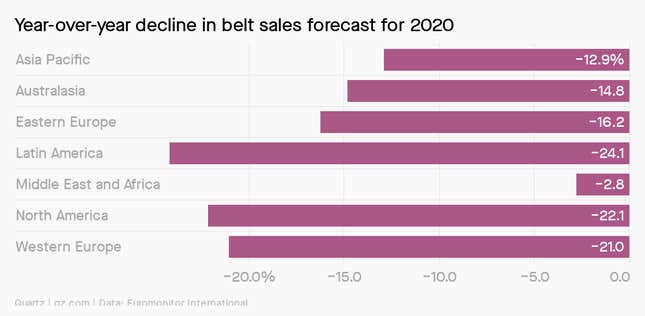Good morning, Quartz readers!
We’re taking a break on Thursday and Friday this week, but will be back in your inbox on Saturday. Stay safe out there.
Here’s what you need to know
Joe Biden described the Trump administration’s transition effort as “sincere.” “It’s not been begrudging so far, and I don’t expect it to be,” the US president-elect told NBC News. Meanwhile, with the US and UK’s so-called “special relationship” under scrutiny, Biden said he doesn’t want a post-Brexit “guarded border” between Ireland and Northern Ireland.
The Dow Jones Industrial Average reached a record high. The US index of large-cap companies surpassed 30,000 points for the first time yesterday, fueled by lower interest rates, coronavirus vaccine progress, and the beginning of the formal presidential transition.
India banned dozens more Chinese apps. The latest list of 43 prohibited apps in a fresh wave of sanctions over disputed Himalayan territory includes Aliexpress, Alibaba’s online retailer. Meanwhile, India’s own tech ecosystem uncovered another unicorn—Cars24 India, a used-car marketplace, said it raised $200 million on a valuation of over $1 billion.
The Weeknd called the Grammys “corrupt.” The Canadian artist said the music awards “owe me, my fans and the industry transparency,” after surprisingly failing to secure a single nomination in a successful year, while some of the usual suspects—Beyoncé, Taylor Swift, etc—did make it onto the list.
Who’s covered?
At this point in the Covid-19 pandemic, three vaccine research and development groups—BioNTech and Pfizer; Moderna; and AstraZeneca and the University of Oxford—have released promising preliminary data about their vaccine candidates. This is good news for the end of the pandemic—but particularly for those countries that have already pre-ordered millions of doses.
Here are the countries (or blocs of countries) that have ordered enough to cover each individual, in descending order of rate of coverage:
🇨🇦 Canada
🇯🇵 Japan
🇬🇧 UK
🇺🇸 US
🇦🇺 Australia
🇪🇺 EU
🇨🇱 Chile
But, as with everything related to Covid-19, it seems, there’s a lot more to it than that.
Charting waistlines
Well, not the size of waistlines, but the need to cinch pants around them. Belt sales have taken a hit from the pandemic. In countries such as the US and UK, consumers who are buying pants are frequently opting for stretchy, comfortable styles rather than structured and rigid ones. You don’t need a belt when your pants have an elastic waistband—if you’re wearing pants at all. Marc Bain expands on the topic.

The great pandemic bake off
In the last nine months, have you done any of the following:
🍜 Tried out an ambitious recipe
🥕 Purchased produce from a local farm or grocer
🎂 Found comfort in old episodes of cooking shows
👵 Called a family member to get a treasured recipe
🧘 Tried to find more sustainable ingredients
If any of the changes in food habits are likely to outlast the pandemic, it’s the slow shift toward mindfulness.
Not that everybody’s suddenly become a beacon of healthy, sustainable eating. But global lockdowns early in the pandemic and the return of stay-at-home orders in some regions have forced many to spend more time in the kitchen than they had in a long while. For those with the time and the income, that’s encouraged a reckoning with the quality of the ingredients that make up their meals. Read more about how the coronavirus pandemic has changed our relationship with food in our latest field guide to how we eat now.
Remember your work family
Don’t leave employees home alone. Metaphorically, that is. Here’s how to check in on mental health around the holidays, which are looking pretty bleak.
Add new people the right way. If a team is struggling, it could likely be an ailing hiring process.
Surprising discoveries
British accents are hotter than French or Italian ones. That’s according to an absolutely correct survey of 30 countries, with Asians especially appreciative.
How to “disappear” on a Chinese street. It took more than two hours, but a group of people managed to avoid having their faces caught by one of the 89 spy cameras on a 0.7 mile-stretch in Beijing.
Americans want tiny turkeys for Thanksgiving this year. It’s awkward, because the industry keeps growing them bigger.
A $1 billion drug bust that wasn’t. Thai officials’ claims of a massive ketamine haul aren’t holding up to chemical testing.
“Hi, this is Seymour Butts.” Canadian prime minister Justin Trudeau fielded a prank call, but it was Russian comedians pretending to be Greta Thunberg, rather than Bart harassing Moe.
Our best wishes for a productive day. Please send any news, comments, sincere calls, and creative ways to dodge spy cameras to hi@qz.com. Get the most out of Quartz by downloading our iOS app and becoming a member. Today’s Daily Brief was brought to you by Hasit Shah 🇬🇧, Jane Li, Tripti Lahiri, Liz Webber, and Susan Howson.